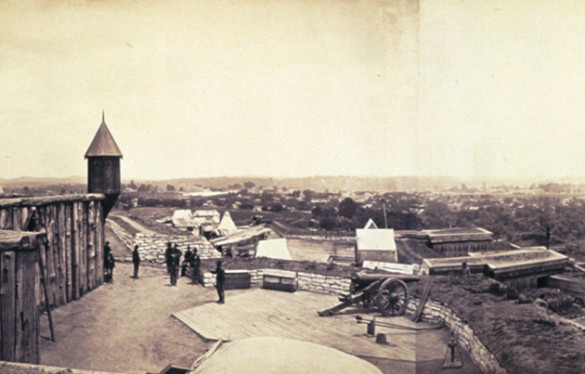
The story of African Americans who escaped from slavery during the Civil War and risked their lives to build and protect Fort Negley will be highlighted during a community program Nov. 5 at the Fort Negley Visitors Center.
“Fort Negley: A Symbol of the Struggle for Civil Rights in Nashville” will begin at 9 a.m. with a keynote address by Bobby Lovett, an author, historian and retired professor of Afro-American history at Tennessee State University.
Following Lovett’s remarks, there will be a panel discussion with Crystal deGregory, who earned her doctorate in history at Vanderbilt University; Reavis L. Mitchell Jr., professor of history and dean of the School of Humanities and Behavorial Social Sciences at Fisk University; and Daniel Sharfstein, professor of law and history and co-director of the George Barrett Social Justice Program at Vanderbilt Law School.
Vanderbilt’s Robert Penn Warren Center for the Humanities is partnering with the Tennessee Historical Society and the Friends of Fort Negley to fund the creation of a new interpretive marker recognizing the continuing relevance of the fort. The marker will be unveiled at the conclusion of the program.
“[rquote]Many African Americans sacrificed their lives to help the federal troops protect Fort Negley,”[/rquote] said Mona Frederick, executive director of the Warren Center. “Many Civil War historians are familiar with this story, but far fewer members of the general public are.”
When Nashville surrendered to the Union army, enslaved men and women sought protection and liberation behind federal lines. The growing population of fugitive slaves became a valuable source of labor. Over the next three years, more than 2,700 free and enslaved African Americans constructed a system of fortifications, blockhouses and earthworks, including Fort Negley.
When Confederates threatened Nashville in 1862, laborers were prepared to defend the fort, the city and themselves with shovels, picks and axes. After the war ended, many former slaves settled in the area to form one of Nashville’s historic African American neighborhoods.
“The story about Fort Negley is largely unknown in our community because the site was in disrepair for so long,” Frederick said. “I would often see the fort on my way to a Nashville Sounds game when the team played at Greer Stadium, but had no idea about its significance. I hope that families and others who are interested in this part of Nashville’s history will come to the program and walk around the grounds to see the fort and get a glimpse of this important slice of Nashville’s history.”
Support for this project has been provided by the National Humanities Alliance Foundation.
The program is free and open to the public. For more information, call the Fort Negley Visitors Center at 615-862-8470.